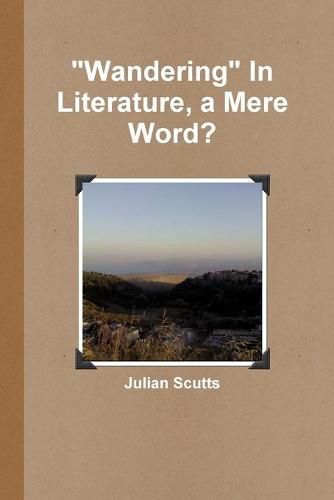Readings Newsletter
Become a Readings Member to make your shopping experience even easier.
Sign in or sign up for free!
You’re not far away from qualifying for FREE standard shipping within Australia
You’ve qualified for FREE standard shipping within Australia
The cart is loading…






This title is printed to order. This book may have been self-published. If so, we cannot guarantee the quality of the content. In the main most books will have gone through the editing process however some may not. We therefore suggest that you be aware of this before ordering this book. If in doubt check either the author or publisher’s details as we are unable to accept any returns unless they are faulty. Please contact us if you have any questions.
This book does not find its starting point in a theory but in the recognition that the word "Wanderer," and other forms based on the common root of the verbs to "wander" and "wandern," recur with conspicuous frequency in the writings of Goethe and English Romantic poets such as William Wordsworth and Lord Byron. A notable scholar, Professor L. A. Willoughby sought an explanation for this phenomnon in Carl G. Jung's theory of the unconscious but Willoughby's sole ambit of reference was what he termed "Goethe's poetry." This restriction could not allow the scope necessary for the study of the collective aspect of the mind's power and influence. This study poses the attempt to widen the survey of "wandering" to a comparison of texts found in a wide variety of authors including Milton, Shakespeare and William Blake.
$9.00 standard shipping within Australia
FREE standard shipping within Australia for orders over $100.00
Express & International shipping calculated at checkout
This title is printed to order. This book may have been self-published. If so, we cannot guarantee the quality of the content. In the main most books will have gone through the editing process however some may not. We therefore suggest that you be aware of this before ordering this book. If in doubt check either the author or publisher’s details as we are unable to accept any returns unless they are faulty. Please contact us if you have any questions.
This book does not find its starting point in a theory but in the recognition that the word "Wanderer," and other forms based on the common root of the verbs to "wander" and "wandern," recur with conspicuous frequency in the writings of Goethe and English Romantic poets such as William Wordsworth and Lord Byron. A notable scholar, Professor L. A. Willoughby sought an explanation for this phenomnon in Carl G. Jung's theory of the unconscious but Willoughby's sole ambit of reference was what he termed "Goethe's poetry." This restriction could not allow the scope necessary for the study of the collective aspect of the mind's power and influence. This study poses the attempt to widen the survey of "wandering" to a comparison of texts found in a wide variety of authors including Milton, Shakespeare and William Blake.